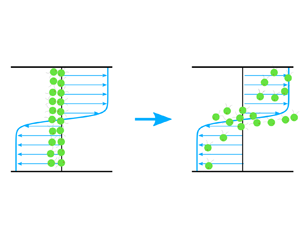Crossref Citations
This article has been cited by the following publications. This list is generated based on data provided by
Crossref.
Shim, Hyoeun
and
Lee, Changhoon
2022.
Effect of gravity-induced fluid inertia on the accumulation and dispersion of motile plankton settling weakly in turbulence.
Physics of Fluids,
Vol. 34,
Issue. 8,
Wang, Bohan
Jiang, Weiquan
Chen, Guoqian
and
Tao, Luoyi
2022.
Transient dispersion in a channel with crossflow and wall adsorption.
Physical Review Fluids,
Vol. 7,
Issue. 7,
Guan, M.Y.
Zeng, L.
Jiang, W.Q.
Guo, X.L.
Wang, P.
Wu, Z.
Li, Z.
and
Chen, G.Q.
2022.
Effects of wind on transient dispersion of active particles in a free-surface wetland flow.
Communications in Nonlinear Science and Numerical Simulation,
Vol. 115,
Issue. ,
p.
106766.
Li, Guangmiao
Gong, Zheng
Jiang, Weiquan
Zhan, Jie
Wang, Bohan
Fu, Xudong
Xu, Mengzhen
and
Wu, Zi
2023.
Environmental Transport of Gyrotactic Microorganisms in an Open‐Channel Flow.
Water Resources Research,
Vol. 59,
Issue. 4,
Wang, Bohan
Jiang, Weiquan
and
Chen, Guoqian
2023.
Dispersion of a gyrotactic micro-organism suspension in a vertical pipe: the buoyancy–flow coupling effect.
Journal of Fluid Mechanics,
Vol. 962,
Issue. ,
Ishikawa, Takuji
and
Pedley, T.J.
2023.
50-year history and perspective on biomechanics of swimming microorganisms: Part II. Collective behaviours.
Journal of Biomechanics,
Vol. 160,
Issue. ,
p.
111802.
Guan, Mingyang
Jiang, Weiquan
Wang, Bohan
Zeng, Li
Li, Zhi
and
Chen, Guoqian
2023.
Pre-asymptotic dispersion of active particles through a vertical pipe: the origin of hydrodynamic focusing.
Journal of Fluid Mechanics,
Vol. 962,
Issue. ,
Wu, Zi
Jiang, Weiquan
Zeng, Li
and
Fu, Xudong
2023.
Theoretical analysis for bedload particle deposition and hop statistics.
Journal of Fluid Mechanics,
Vol. 954,
Issue. ,
Wu, Zi
Zeng, Li
Li, Guangmiao
Gong, Zheng
Zhan, Jie
Jiang, Weiquan
Xu, Mengzhen
and
Fu, Xudong
2024.
Onset for Active Swimming of Microorganisms to Shape Their Transport in Turbulent Open Channel Flows.
Water Resources Research,
Vol. 60,
Issue. 9,
Guan, Mingyang
Jiang, Weiquan
Tao, Luoyi
Chen, Guoqian
and
Lee, Joseph H.W.
2024.
Migration of confined micro-swimmers subject to anisotropic diffusion.
Journal of Fluid Mechanics,
Vol. 985,
Issue. ,
Yang, Fangyu
Yang, Fan
Zeng, Li
Jiang, Weiquan
Wang, Ping
Hu, Peng
and
Wu, Zi
2024.
Comprehensive analysis of environmental dispersion of buoyant particles in three-dimensional open-channel flows.
Physics of Fluids,
Vol. 36,
Issue. 12,
Guan, Mingyang
and
Chen, Guoqian
2024.
Streamwise dispersion of soluble matter in solvent flowing through a tube.
Journal of Fluid Mechanics,
Vol. 980,
Issue. ,
Zeng, Hanhan
Jiang, Weiquan
Wang, Bohan
Zeng, Li
Guan, Mingyang
Li, Zhi
and
Chen, Guoqian
2024.
Transient dispersion of settling gyrotactic microorganisms in an open channel flow.
Physics of Fluids,
Vol. 36,
Issue. 9,
Zeng, Hanhan
Chen, Kuang
Guo, Jinlan
Jiang, Weiquan
and
Chen, Guoqian
2025.
Dispersion of tumbling microswimmers in a plane poiseuille flow.
Physics of Fluids,
Vol. 37,
Issue. 9,
Zeng, Li
Yang, Fan
Wang, Bohan
Jiang, Weiquan
Guan, Mingyang
Zhao, Yijun
and
Wu, Zi
2025.
Migration of gyrotactic micro-organisms in surface gravity waves.
Physics of Fluids,
Vol. 37,
Issue. 8,
Wang, Bohan
Jiang, Weiquan
Zeng, Li
and
Chen, Guoqian
2025.
Buoyancy–flow coupled dispersion of active spheroids in a vertical pipe: effects of elongation and settling.
Journal of Fluid Mechanics,
Vol. 1007,
Issue. ,
Ogawa, Keito
and
Ishimoto, Kenta
2025.
Generalized Taylor dispersion of chiral microswimmers.
Philosophical Transactions of the Royal Society A: Mathematical, Physical and Engineering Sciences,
Vol. 383,
Issue. 2304,
Zeng, Hanhan
Jiang, Weiquan
Guan, Mingyang
Lee, Joseph Hun-wei
and
Chen, Guoqian
2025.
Dispersion of confined microswimmers with diffuse reflection boundary condition: asymptotic and transient solutions.
Journal of Fluid Mechanics,
Vol. 1018,
Issue. ,
Wang, Bohan
Jiang, Weiquan
Zeng, Li
Wu, Zi
and
Wang, Ping
2025.
Taylor–Aris dispersion of active particles in oscillatory channel flows.
Journal of Fluid Mechanics,
Vol. 1021,
Issue. ,
Yang, Liu
Yang, Zhong-hua
Liu, Meng-yang
Ai, Yi-dan
and
Huai, Wen-xin
2025.
Simulating stochastic transport: An efficient random displacement model for multi-domain applications in ecology, hydraulics, and environmental systems.
Journal of Hydrodynamics,
Vol. 37,
Issue. 3,
p.
421.



